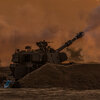Israel’s military says it killed nine of Iran’s top nuclear scientists Friday as part of its strikes aimed at crippling the country’s nuclear capabilities.
The Israeli military said the scientists had played key roles in advancing Iran’s nuclear program, and called their deaths a “significant blow” to Iran’s ability to pursue weapons of mass destruction.
The attack followed intelligence from Israel’s Mossad spy agency, which Israel says suggested Iran was close to developing a nuclear weapon — which Israel considered a direct threat to its national security.
The strikes came a day after the U.N. nuclear watchdog declared that Iran wasn’t complying with nuclear nonproliferation agreements aimed at halting the spread of nuclear weapons. Iran reacted saying it would create a new uranium enrichment facility. Iran says its uranium enrichment program is for peaceful purposes.
Iran responded to the Israeli strikes with a barrage of missiles, killing at least three people and injuring dozens more. Iranian state media said there would be “heavy and destructive attacks against Israel” Saturday night as well
The escalation has raised fears of a wider regional conflict, one that could rope in neighboring countries and threaten to destabilize global energy markets.
Sirens blared throughout Tel Aviv late Friday and smoke billowed in the sky as people ran for shelter as Iran fired hundreds of missiles at Israel in retaliatory strikes, which continued into Saturday morning.
Most Iranian missiles were intercepted by Israel’s powerful air defense system, but some hit neighborhoods around Tel Aviv.
The Mizrahi family was in their home’s bomb shelter when a missile hit close by in their suburb of Rishon LeZion, outside Tel Aviv.
Shoshanah Mizrahi, 43, said the explosion was terrifying. “All the house was shaking, there was smoke, the window in the shelter was broke,” she said.
Their home is destroyed. Glass blown out from windows was strewn all over the floor and a hole gaped in the roof.
Outside the house, dozens of people stood to observe the damage. Windshields of cars were shattered, bulldozers were removing rubble.
A U.S. official confirmed to NPR that U.S. ground-based air defense systems helped shoot down the Iranian missiles targeted at Israel. The U.S. official spoke on the condition of anonymity because they were not authorized to speak publicly.
Prime Minister Benjamin Netanyahu has vowed that more attacks on Iran were on the way.
Speaking to the U.N. Security Council on Friday, Iran’s U.N. ambassador Amir Saeid Iravani accused Israel of trying to “kill diplomacy” and called the country “the most dangerous and terrorist regime in the world.” He urged the Security Council to hold Israel accountable.
Iravani said 78 people were killed and over 320 people — mostly civilians — were injured. Iran’s state television reported that a residential building in Tehran was also hit, and the death toll was expected to rise.
Israeli emergency services organization Magen David Adom said three people were killed and dozens more injured. The Palestinian Red Crescent said that children were among the Palestinians injured by shrapnel near the city of Hebron in the occupied West Bank.
Israeli Defense Minister Israel Katz said Iran “crossed red lines” by firing missiles at “civilian population concentrations,” and warned it would would pay a “very heavy price,” the Times of Israel reported.
In a video statement on Friday evening, Prime Minister Netanyahu said the attack on Iran was in the works for months since September, following Israel’s assassination of Hassan Nasrallah, leader of the Lebanese militant group Hezbollah, in Beirut.
Netanyahu warned that once the region’s “Iranian axis” was broken, Iran would accelerate its nuclear program. The attack on Iran was supposed to occur in April but it was postponed, Netanyahu added.
The U.S. and Iran were planning to begin the sixth round of talks about Iran’s nuclear program on Sunday in Oman. The U.S. was trying to strike a deal with Iran to limit its uranium enrichment in exchange for lifting sanctions, which have crippled Iran’s economy.
On Saturday, the Omani foreign minister said on social media that the meeting was canceled. But he said “diplomacy and dialogue remain the only pathway to lasting peace.”
President Trump said he had been urging Iran to reach a nuclear deal.
“Two months ago I gave Iran a 60 day ultimatum to ‘make a deal.’ They should have done it!” he wrote on Truth Social. “Now they have, perhaps, a second chance!”
In a separate post earlier on Friday, Trump warned Iran that “it will only get worse” and urged Tehran to “make a deal, before there is nothing left.”
Trump said he was giving the nation “chance after chance to make a deal” on its nuclear program and said that the alternative “would be much worse than anything they know, anticipated, or were told.”
NPR’s Tom Bowman and Michele Kelemen contributed reporting.
Source: www.npr.org
